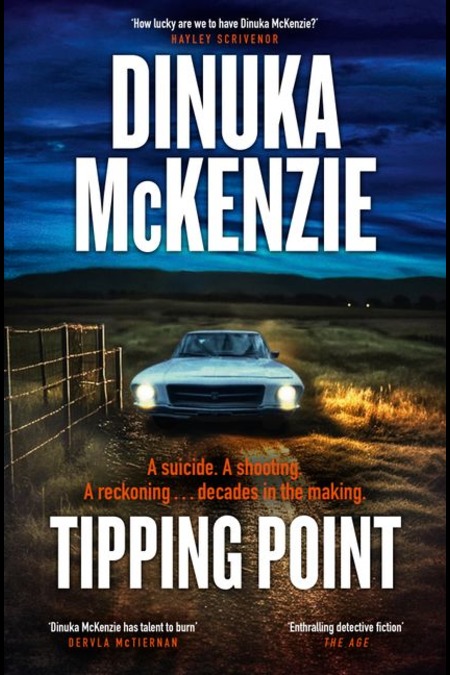(courtesy Harper Collins Australia)
The greatest accomplishment for any writer, and this is from a humble blogger (my own time) and content writer (day job), is to get someone who would not ordinarily read a particular genre to pick a book clearly belonging to it and to spend valuable reading hours on it.
True, you must get them to pick up the book in the first place, and in the case of crime writer Dinuka McKenzie (The Torrent, Taken) and her newest release, Tipping Point, that’s accomplished by a robustly active and engaged social media presence, and some adept promotion by her publisher, but once attention has been grabbed, you must hold that reader in a narrative vice-like grip in a style of story they wouldn’t ordinarily consider.
Easier said than done since a non-reader of a certain genre is basically sitting there with a mental trigger finger ready to bail on the book at the first time of something displeasing, but McKenzie manages it, in the case of this reader at least, by investing a huge of relatable, accessible humanity into a story that on the surface at least is all about murder and mystery and investigation.
All that of she accomplishes very well indeed, offering up a mystery that is begging to be solved and which involves an immense amount of work on behalf of its protagonist, Detective Kate Miles, to get to the bottom of a suicide, and death by gunshot of two men who are, coincidence or not, old school friends of Kate’s brother, Luke.
Her skin prickled as she zoomed in on the man’s maroon-print T-shirt. She had stared at that exact shirt, smelling of smoke and sweat all morning. The person Marcus had spent his last hours on earth with was her brother. Luke.
Even if crime novels are not normally your thing, but especially if they are, of course, McKenzie’s writing speaks of someone born to spin stories, not simply in this genre, but you suspect pretty much anything she wants to turn her hand to.
You are very quickly drawn into the machinations of the investigation in Tipping Point because McKenzie makes you care about everyone involved.
And we mean, everyone.
Even the suspects, and that means Luke who is identified as a person of interest very early on, who are given a chance to emerge fully formed and understandable, right along the main characters such as Kate, her husband Geoff and Kate’s father.
It’s the time taken to not only fill in fascinating amounts of detail about these character but to place them in situations and a context that feel grounded and instantly relatable by anyone with a beating heart, that makes a novel like Tipping Point work so well.
That relatability particularly extends to Kate, who was front and centre in the first two novels and whose raw, flawed humanity – not fatally so; she’s simply presented like any of us would be, as someone doing her best getting some wins, more losses than she’d like and doing her best – positions Tipping Point and its predecessors as a human story that just happens to take place and thrive in the crime genre.
(courtesy official author site)
The key point, of course, is that while she could, as noted, write anything you suspect, and do brilliantly well at it, McKenzie is especially gifted as stacking all the pieces in a mystery together, one by one, bit by bit and doing it in such a way that not only does it keep you wholly engaged but it all makes perfect sense at the end.
One reason that this reviewer may not be enamoured of crime writing as some other genres is because some lesser writers have simply gone “Ta-dah!” at the end and expected you to buy that there is no real link to the stunning finale from everything that’s gone before it.
Those gaps in the construction of the narrative leave a bad taste in the reading mouth, not simply because all the investment in the story and its characters doesn’t fully pay off, but because it feels a little like cheating.
McKenzie however accounts for every clue and every connection, working meticulously to make sure that all those storytelling threads cohesively and comprehensively add to a totally logical picture by the end, one that amply rewards paying attention to every conversation, every observation and every twist and turn, though miraculously the authors isn’t dependent on those to hold your interest.
Narrative surprise are there in Tipping Point and they are executed beautifully, but the novel isn’t dependent on those to keep you engaged nor do to ensure that you give a damn.
She flung the words in his face like a missile and turned away, suddenly exhausted. Pushing against her father as he tried to reach for her.
That’s impressive in a 21st century world where tabloid reveals have inveigled their way in everywhere, making readers (and viewers) addicted to the idea that every chapter ends with a crescendo and every conversation a massive buster wide of expected storyline trajectory.
Those can be fun, sure, but they are often overused in modern storytelling and its testament to how well McKenzie tells her stories that she isn’t dependent on them to make you want to keep reading and that it’s the sheer power of her humanity-filled business-as-usual narrative spinning that keeps you turning those pages so fast that you may well risk paper cut as you fly eagerly through the book.
Put simply, this is one author who doesn’t needs the bells and whistles to captivate and enthrall you.
She has them, and uses them well but sparingly, and it’s that approach to good old-fashioned but inspired storytelling, grounded in people who matter and events that resonate, that really making Tipping Point comes so gloriously and excitingly alive.
Tipping Point is a brilliant addition to McKenzie’s portfolio, bringing together a compelling mystery, a real sense of time and place that rings true – this reviewer grew up in the area and the author evokes it spectacularly well – characters who live and breathe (or, sadly, don’t, as the case may be) and an journey towards truth and an ending that feel like they belong together and which deliver a sense of satisfaction so great that even if crime novels aren’t your thing, you’ll be glad you took the plunge and dived on in.

